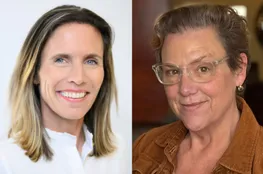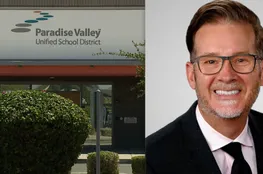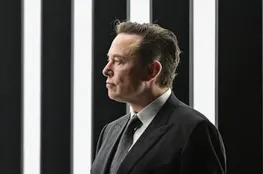When Kara Durrett and Jesse Burgum, the duo behind the production-finance company Pinky Promise, first met, it was 104 degrees. They were filming in the attic of a church in Decatur, Georgia, working on 'Honk for Jesus. Save Your Soul,' the first movie Burgum financed where Durrett was working as an independent producer. 'A lot of people were focusing on where they were going to sit in relationship to the monitor. Kara was finding fans and the AC guy. I was like, ‘OK, this girl’s the real deal,’' recalls Burgum. The film went on to screen at the Sundance Film Festival, selling to Focus Features. Durrett and Burgum went on to form a partnership that has encompassed titles like Andrea Arnold’s Cannes entry 'Bird,' Scarlett Johansson’s directorial debut via Sony, and Gia Coppola’s Pamela Anderson starrer, which premiered on Sept. 6.
Ahead of touching down in Canada, Pinky Promise discussed the state of indie financing and dancing at Cannes with Arnold. Most financiers come and they’re just bringing their friends or pretending to know a lot. Jesse would just come and say, 'I don’t know, I’ve never been on a set before.' Near the end of the movie, Jesse said, 'Hey, I’m going to raise money for women, POC, and LGBT filmmakers and start a company. Do you want to come on board?' I remember thinking I’d met many financiers who say that. I underestimated her. I left to do a different movie in a swamp. Meanwhile, Jesse was building, fundraising, and keeping me updated. Over 18 months, she raised $26.5 million. That’s when we started our producing partnership and thought, 'How do we find these filmmakers who are not getting their movies made and how do we make those?'
We will always finance filmmakers like Andrea Arnold. We’ll take risks on movies even in tough times. We’ll produce projects that feel new and exciting. Pinky Promise results from an actress growing up in a business-oriented household. There’s a lot you pick up around the dinner table that you wouldn’t know from my résumé or schooling, which is in classical acting. I've learned a lot from these relationships and past experiences. I started cold emailing people. There was a rumor that Jesse’s funding came from her family, but her dad isn’t an investor. Jesse built a business plan and structure and raised the money independently. Initially, I was protective of her achievements, but now I enjoy seeing people realize they underestimated her.
We function like a VC on the financing side, with a disciplined selection process. We have due diligence sheets and a four-Ps process: Progress, Profit, Prestige, and Partners. These factors determine if we do a project. We recently decided to understand more about distribution. Our focus has shifted from just making movies to ensuring they are seen. We even have preliminary conversations with distributors to share risks and improve marketing. For Scarlett’s movie, we coordinated with Sony and TriStar on distribution planning. Jesse’s strength is in hiring and growth. Her business background helps, while I always want to expand quickly. Jesse prefers cautious, planned growth.
Any aspirational company needs to balance immediate actions with future goals. We don’t plan to start a distribution company but aim to address the oversupply of films not reaching audiences. Entertainment is steeped in tradition, which can resist change, especially following disruptions like streaming. Industry conversations often focus on returning to 'the good old days,' but that’s dangerous as it wasn't perfect then either.
























